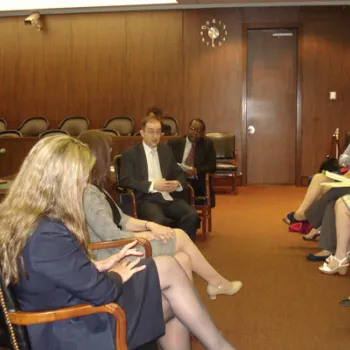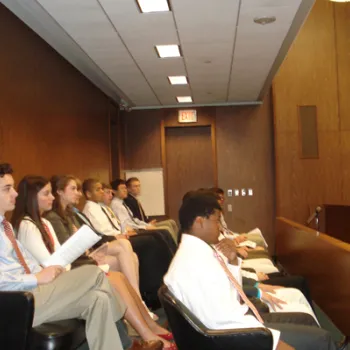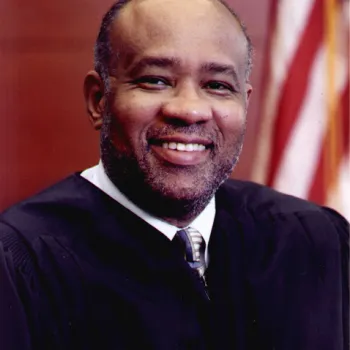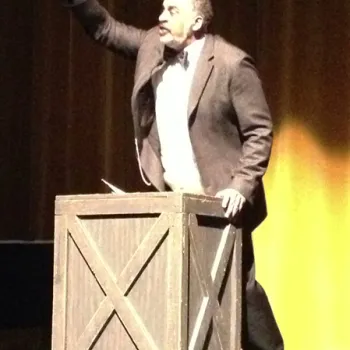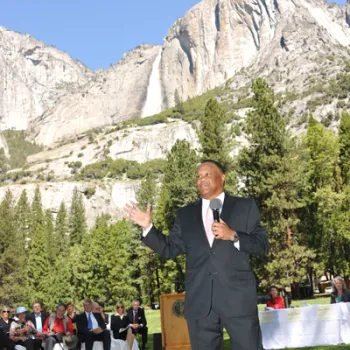Throughout May, federal courts brought students together under the umbrella of this year's Law Day theme, "Realizing the Dream: Equality for All." In urban courtrooms in Pennsylvania, a suburban school auditorium in Minnesota, and under a blue sky in California's Yosemite Valley students from elementary, middle, and high schools participated in experiences designed to heighten their awareness of the justice system.
A variety of interactive programs facilitated by federal and state judges, Federal Public Defender offices, U.S. Attorney's offices, bar associations, and community leaders across the nation made real and relevant the right to counsel; the struggle for racial equality; and the rule of law. The programs gave students a memorable lesson in how these abstract concepts have a practical presence in their everyday lives.
In the Eastern District of Pennsylvania, federal courts in Philadelphia, Allentown and Reading opened their courtrooms to 250 students from 11 area schools. Students reenacted two landmark U.S. Supreme Court cases: Gideon v. Wainwright, which established a constitutional right to counsel in criminal cases, and In re Gault, which held that juveniles are entitled to due process rights under the 14th Amendment.
Students used scripts prepared by the Administrative Office of the U.S. Courts, to play the parts of the historic figures in the cases. The courtroom reenactments were followed by discussions led by Judges, Assistant U.S. Attorneys and Assistant Federal Public Defenders. In all, 12 District, Magistrate and Bankruptcy Judges and 30 attorneys took part. The Philadelphia, Lehigh County and Berks County bar associations provided lunches for the students.
"The students were engaged in both the role play and the ensuing discussion," said U.S. District Judge Cynthia M. Rufe, who organizes educational outreach programs for the Eastern District of Pennsylvania. "It was one of our best-received programs yet."
As a former public defender who specialized in juvenile representation, Judge Rufe said she found the Gideon and Gault story lines especially relevant in a time of contracting budgets. "Gideon is as significant today, in its 50th anniversary year, as ever. Qualified counsel for all individuals who are charged with crimes is interpreted by our courts to be a fundamental constitutional right, which all criminal justice systems must provide. It is a question of fairness and equality, and the efficient operation of the justice system also depends on the delivery of effective representation for the indigent."
Judge Rufe said the AO's educational materials "have been invaluable," enabling federal courts to stage programs without creating them from scratch. But she said this year's themes were especially strong. "Gault has personal significance for young people. Plus, the format was new. When I read the program, I knew it was a winner."
In Bloomington, Minn., a suburb south of Minneapolis, judges and Federal Bar Association members focused on an earlier episode in history: the Dred Scott Decision. Although the Supreme Court's pro-slavery decision is widely reviled today, organizers focused on the quest for freedom by Dred Scott and his wife Harriet, and the importance of equal justice. The couple married in what is now Minnesota while Dred Scott was stationed there with his master, a U.S. Army surgeon.
According to U.S. District Judge Donovan W. Frank, a plan by Bloomington city leaders to rededicate the local Dred Scott Playfields morphed into a multi-event celebration of freedom and the courts, after they asked Chief Judge Michael J. Davis, of the U.S. District Court in Minnesota, to speak.
For the first time, instead of inviting youngsters to the federal courts for Law Day, state and federal judges gave a presentation in a high school auditorium to 800 students from two schools. The students saw a 20-minute living history reenactment of the Scotts' lives and legal odyssey, followed by a panel discussion involving four African American judges from Minnesota courts.
Minnesota Court of Appeals Judge Kevin Ross played the role of Frederick Douglass and two local actors played Dred and Harriet Scott. The play opened with Dred Scott speaking to students as if he were still a hotel porter before the Civil War.
"You could have heard a pin drop" during the living history reenactment and panel discussion, Judge Frank said. After the program, several students approached the judges, asking how they could enter the legal profession. "A message we keep repeating at these programs is, 'If we can do it, so can you.'"
Prior to the school assembly, court staff, federal prosecutors and federal public defenders visited 13 history classes, providing a detailed account of the Scott case. Lynne Jackson, a descendant of Dred and Harriet Scott, spoke at several events, including a public event in Bloomington co-sponsored by the U.S. District Court, Federal Bar Association, and the Bloomington Human Rights Commission and Parks and Recreation Division.
Farther west, in a California setting made famous by photographer Ansel Adams, court officers spoke to students about the rule of law, against the backdrop of Yosemite Falls.
A panel of speakers from the California Eastern District addressed 160 students from five rural schools. The speakers included Chief Judge Morrison C. England, Jr., Executive Assistant U.S. Attorney Sylvia Quast, and Federal Public Defender Heather Williams.
"The theme was the importance of law," said Magistrate Judge Michael J. Seng, who also spoke. "We made the point that our system has a unique way of protecting rights and liberties." He said the students were highly engaged, especially when Williams answered questions about why she defends "criminals," by noting that defendants sometimes are wrongly convicted or excessively punished.
It was the first ever Law Day commemoration at Yosemite National Park, which has had a magistrate judge or commissioner since 1920. With support from the local Federal Bar Association chapter, busing and lunches were provided for the students.
"We hope this will be the first of many Law Day celebrations here," Magistrate Judge Seng said. "Yosemite is a spectacular place to celebrate the law. It's a spectacular place to celebrate what America is."
The Office of Public Affairs, at the Administrative Office of the U.S. Courts, develops and tests new court programs throughout the year for Law Day, Constitution Day, Bill of Rights Day, anniversaries of landmark cases, naturalization ceremonies, heritage months and a range of timely topics of interest to high school students and their teachers. They are posted at Educational Resources.
Court events are designed to be courtroom-ready with 45 minutes of reading the prepared materials posted on the website. Programs can be modified by participating courts to meet local needs, talents, and interests. For more information contact National Outreach Manager Rebecca Fanning at aogrp_outreach@ao.uscourts.gov.
Subscribe to News Updates
Subscribe to be notified when the news section is updated.

